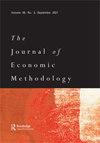The soul of economics: editorial
IF 1.8
3区 经济学
Q2 ECONOMICS
引用次数: 0
Abstract
The Financial Crisis of 2007–2009 has been one of the worst economic crises since the Great Depression of the 1930s. In addition to directly impacting the economy, it had substantial ramifications also for economics as a science (Colander et al., 2011; Kirman, 2010; Lawson, 2009). In its aftermath, there has been considerable soul-searching within the economics profession that concerned, among other things, its methodological and conceptual core, the lack of trust in the epistemic qualities of economic theorizing and concerns about its function as a policy science. This soul-searching was triggered mainly by questions about the potential causes of the crisis and the failure of economics in predicting its occurrence. The claim was that the discipline had failed to accurately predict the crisis and explain its causes, and to offer useful policy recommendations to help its remedy (e.g. Akerlof et al., 2014; Allen & Carletti, 2010; Krugman, 2011). Some critics even questioned the scientific status of economics itself (e.g. Taleb, 2010). This soul-searching led to discussions and a fundamental reassessment of the central assumptions, methodologies, and principles underlying economic theories and models. Scholars from within and from outside economics were puzzled about what was quickly perceived as a lack of performance of economics as a scientific enterprise and the discipline’s failure to fulfill its expected social function (Krugman, 2011). This also revived several more general methodological debates about the usefulness of traditional as well as more recent theoretical, conceptual, and empirical tools used by economists to explain and predict economic phenomena and to suggest policy measures towards enabling social change. Those debates did not only remain within academic circles, but spilled over also to the policy realm, and to the broader public. Indeed, they engendered a deep skepticism in some corners concerning economists’ claims to economic expertise and led to widespread mistrust in their ability to assess and recommend good policies. Today, fifteen years after the crisis, it is time to take stock and ask the question where economics currently stands regarding this soul-search. This special issue provides a platform to present and reflect on the current status, and on some of the main arguments and outcomes of this search. Largely consisting of papers that were presented at a conference entitled The Soul of Economics and organized by Catherine Herfeld, Chiara Lisciandra, and Carlo Martini at the University of Zurich (Switzerland) in 2019, it provides a sketch of debates engaged with the contemporary state of economics fifteen years after the Financial Crisis. The articles collected here reflect in different ways upon economics in its current state in light of recent criticisms and calls for reform. They show that although economics’ conceptual, methodological, epistemological, and policy dimensions have been questioned throughout its existence, there is a renewed and continuing interest in questions surrounding the core constituents and goals of economics as an epistemic endeavor and as a policy science. This ongoing interest among economists, historians and philosophers of economics speaks to the observation that the crisis has renewed those debates and that economics has not yet come to rest. Against this background, the first goal of this special issue is to identify some of the major debates that have been opened or revived after the Financial Crisis and that are representative of what we take the soul-searching in economics to be. The second goal is to enable drawing some preliminary conclusions from the results presented about the current state of economics. The overarching aim of经济学的灵魂:社论
2007-2009年的金融危机是自上世纪30年代大萧条以来最严重的经济危机之一。除了直接影响经济之外,它还对经济学作为一门科学产生了重大影响(Colander et al., 2011;科曼,2010;劳森,2009)。在其后果中,经济学专业内部进行了相当大的反思,其中包括其方法论和概念核心,对经济理论化的认识论质量缺乏信任以及对其作为政策科学的功能的担忧。引发这种自我反省的主要是对危机潜在原因的质疑,以及经济学在预测危机发生方面的失败。主张是,该学科未能准确预测危机,解释其原因,并提供有用的政策建议,以帮助其补救(如Akerlof等人,2014;Allen & Carletti, 2010;克鲁格曼,2011)。一些批评家甚至质疑经济学本身的科学地位(如Taleb, 2010)。这种自我反省导致了对经济理论和模型的核心假设、方法和原则的讨论和根本性的重新评估。经济学内外的学者对经济学作为一门科学事业的表现不佳以及该学科未能履行其预期的社会功能感到困惑(克鲁格曼,2011)。这也重新引发了一些更普遍的方法论辩论,这些辩论是关于经济学家用来解释和预测经济现象以及提出促进社会变革的政策措施的传统工具以及最近的理论、概念和经验工具的有用性。这些争论不仅局限于学术界,还波及到政策领域和更广泛的公众。事实上,他们在某些角落对经济学家声称的经济专业知识产生了深深的怀疑,并导致对他们评估和推荐好政策的能力的普遍不信任。如今,危机已经过去15年了,是时候进行评估,并提出这样一个问题:在这种自我反省方面,经济学目前的立场是什么?本期特刊提供了一个展示和反思当前现状的平台,以及这一研究的一些主要论点和结果。主要由2019年在苏黎世大学(瑞士)举办的题为“经济学之魂”的会议上发表的论文组成,该会议由Catherine Herfeld, Chiara Lisciandra和Carlo Martini组织,它提供了金融危机15年后与当代经济学状况有关的辩论的草图。这里收集的文章以不同的方式反映了经济学在最近的批评和呼吁改革的现状。他们表明,尽管经济学的概念、方法、认识论和政策维度在其存在的整个过程中一直受到质疑,但围绕经济学作为一门认识论努力和一门政策科学的核心组成部分和目标的问题,出现了新的和持续的兴趣。经济学家、历史学家和经济学哲学家们对经济问题的持续关注,证明了这样一种观点:这场危机重新引发了这些争论,而经济学尚未得到休止。在此背景下,本期特刊的第一个目标是确定金融危机后开启或复活的一些主要辩论,这些辩论代表了我们对经济学的反思。第二个目标是从目前的经济状况得出一些初步的结论。的首要目标
本文章由计算机程序翻译,如有差异,请以英文原文为准。
求助全文
约1分钟内获得全文
求助全文
来源期刊

Journal of Economic Methodology
ECONOMICS-
CiteScore
3.20
自引率
8.30%
发文量
23
期刊介绍:
The Journal of Economic Methodology is a valuable forum which publishes the most current and exciting work in the broad field of economic methodology. The Journal of Economic Methodology addresses issues such as: ■Methodological analysis of the theory and practice of contemporary economics ■Analysis of the methodological implications of new developments in economic theory and practice ■The methodological writings and practice of earlier economic theorists (mainstream or heterodox) ■Research in the philosophical foundations of economics ■Studies in the rhetoric, sociology, or economics of economics
 求助内容:
求助内容: 应助结果提醒方式:
应助结果提醒方式:


